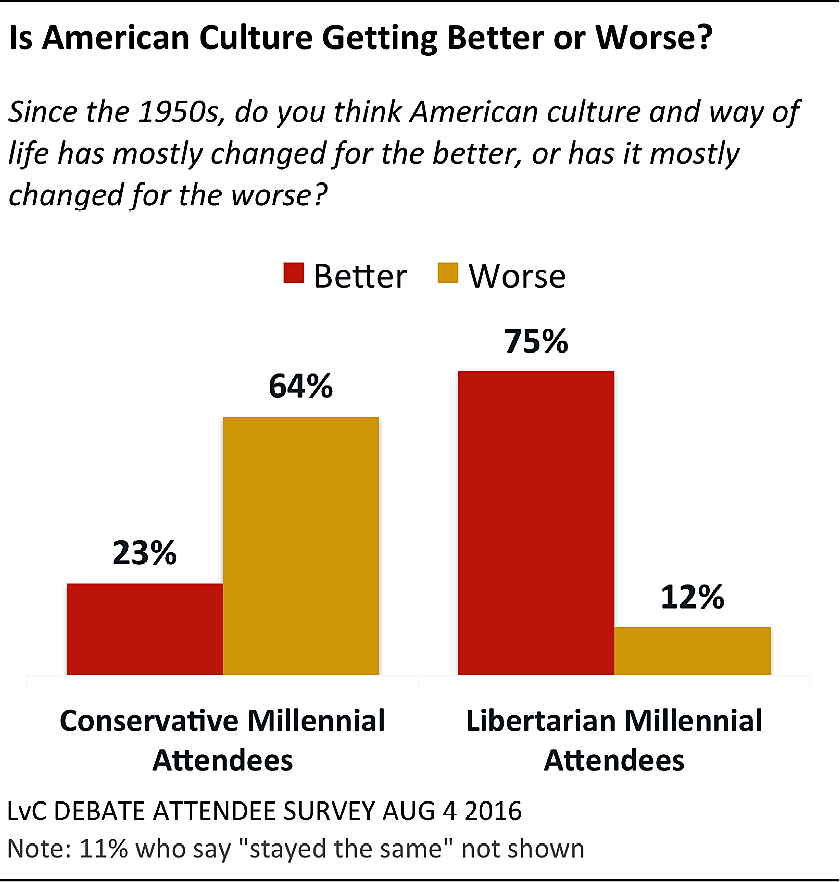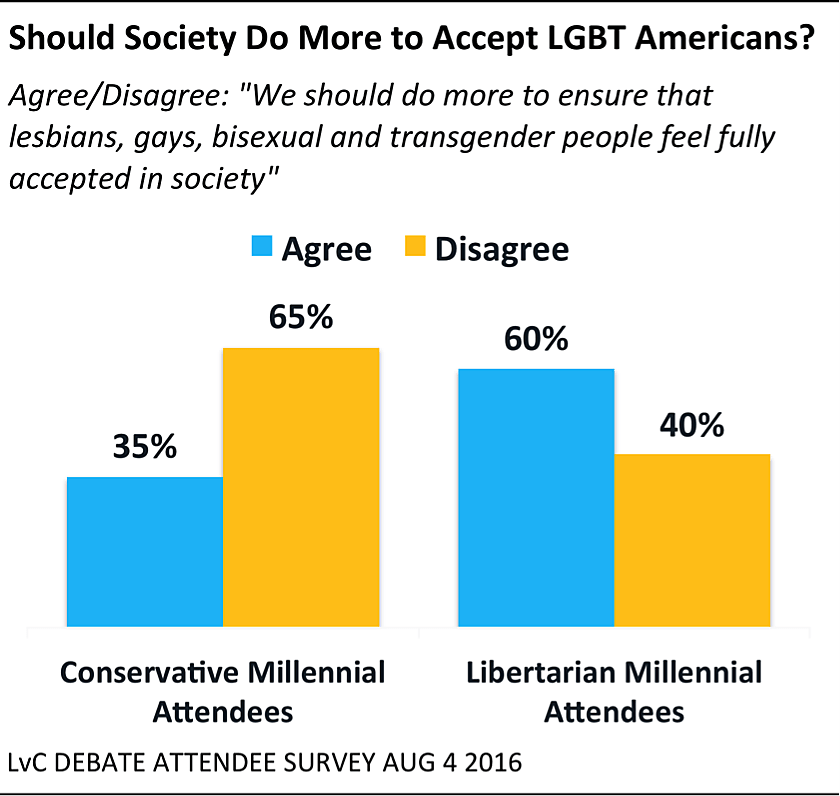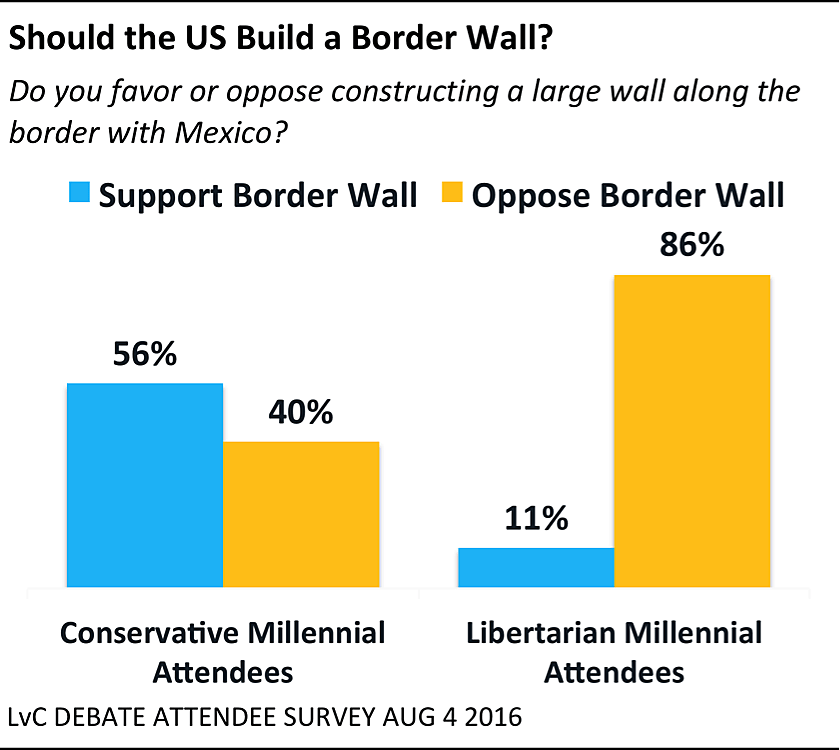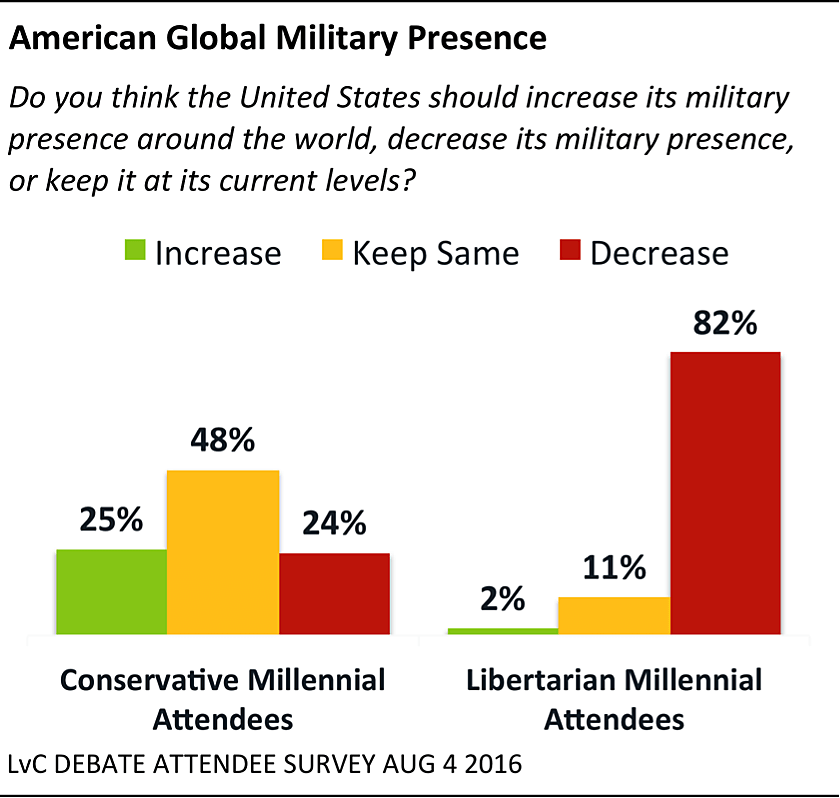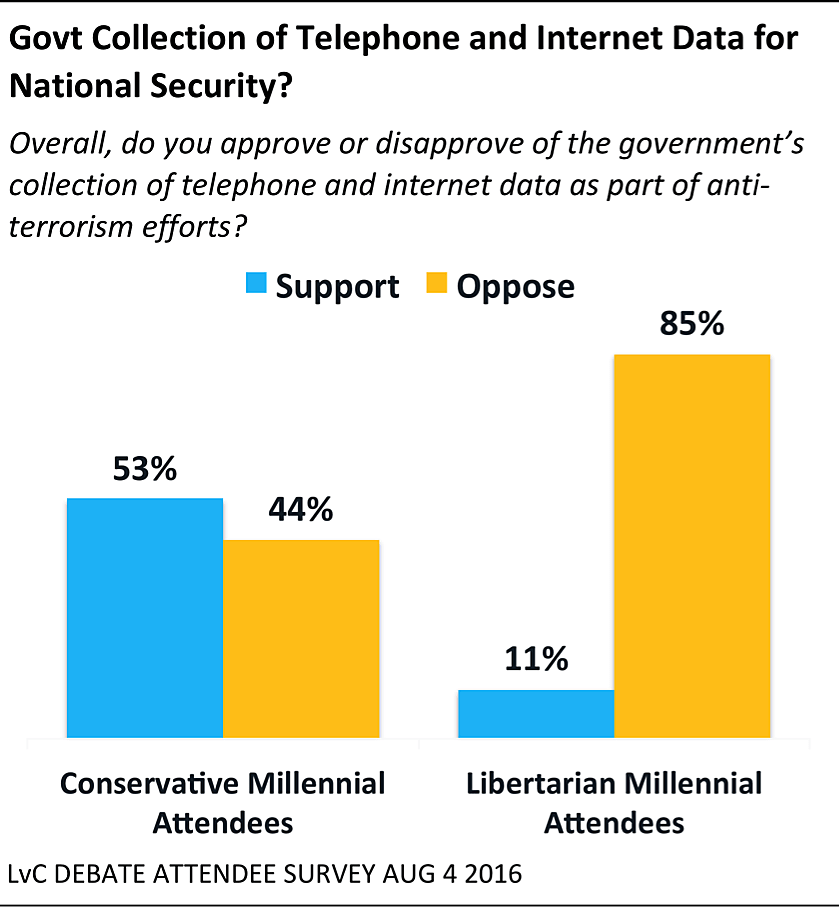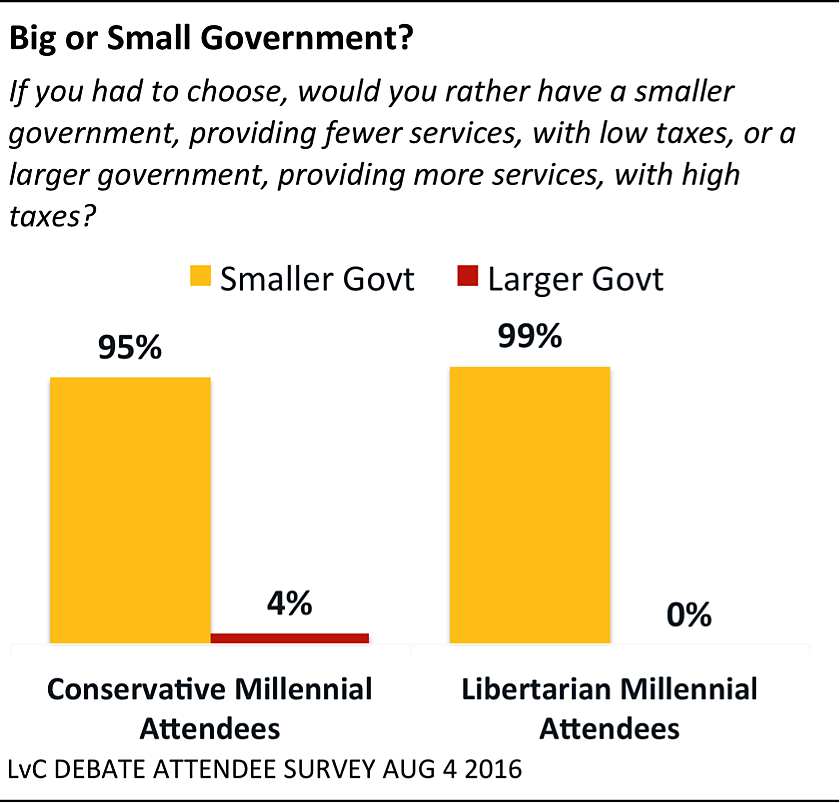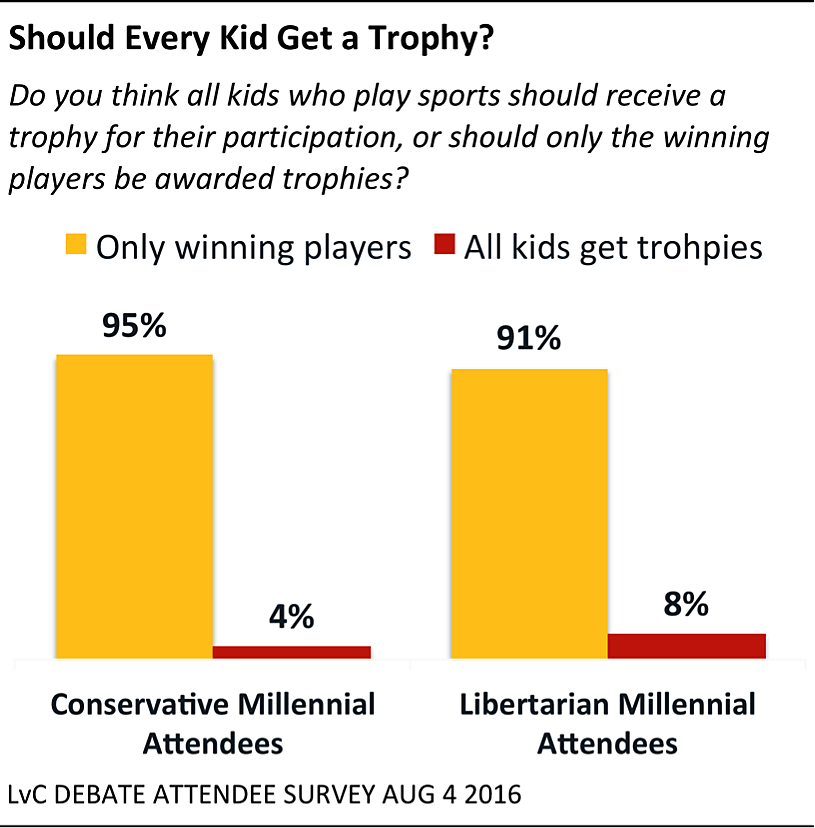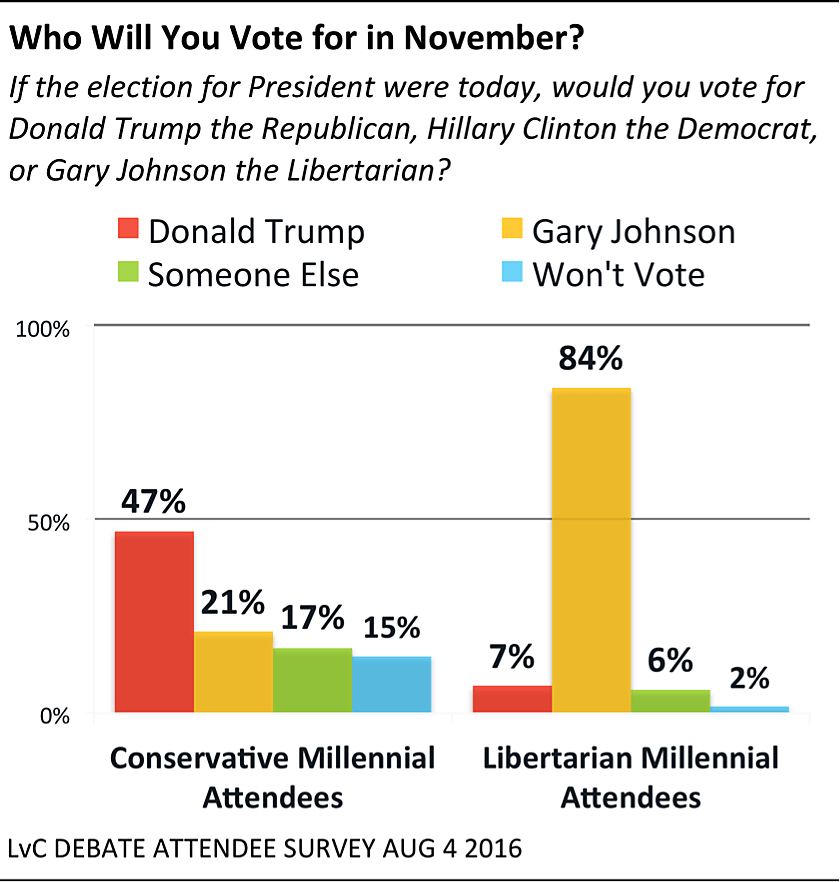The Cato Institute and Heritage Foundation recently co-hosted a debate in which interns from both organizations debated whether conservatism or libertarianism is the better philosophy. At the conclusion of the debate, the Cato Institute conducted a post-debate survey of attendees finding important similarities between millennial conservative and libertarian attendees on skepticism toward government economic intervention and business regulation, but also striking differences in attitudes toward immigration, LGBT issues, national security, privacy, foreign policy, and perceptions of bias in the justice system.
Full LvCDebate Attendee Survey results found here.
What Are Their Priority Issues?
The survey asked conservative and libertarian attendees to rate on a scale of 1 to 5 how concerned they were about nineteen different issues.
Note: This chart displays the mean level of concern (on a scale of 1–5) across 19 different issues for both conservative and libertarian millennials who attended the Libertarianism v. Conservatism intern debate at the Cato Institute. Moving from the inner to the outer circles indicates an increasing level of concern for each respective issue. Results from statistical tests are shown which indicate if conservatives and libertarians significantly differed in their concern for the issue *** p<.001 ** p < .01 * p < .05.
Despite a multitude of differences, millennial libertarian and conservative attendees share almost the same top five political priorities:
- Size of government
- Government spending and debt
- Taxes
- Economy/jobs
Conservatives’ other top five priority is national security/terrorism and libertarians’ is government regulation of business. The groups diverge widely on non-economic issues. Libertarian attendees are statistically more concerned about (1) government domestic surveillance, (2) the criminal justice system, (3) drug prohibition, (4) racial inequality, and the (5) environment. On the other hand, conservatives are significantly more concerned about (1) national security/terrorism, (2) abortion, (3) morality in society, and (4) immigration. Both were similarly less concerned about income inequality and drug use, and similarly concerned about education and healthcare.
Nostalgic or Optimistic?
Similar to national surveys of conservatives, 64% of millennial conservatives say American culture and way of life has mostly “changed for the worse” since the 1950s. But millennial libertarians disagree: 74% of libertarians say America is “getting better.” Of both groups, only one in ten (11% and 12%, respectively) thought that American culture has stayed the same.
No Man is an Island?
Fully 60% of conservative attendees “strongly agree” that “no man is an island” compared to just 14% of libertarian attendees. Once those who “strongly” and “somewhat” agree are combined together, 88% of conservatives and 68% of libertarians agree with the statement. Another 26% of libertarians flat out disagree that “no man is an island,” nearly 3x as likely as conservatives (9%). This underlying difference in perspective likely drives disagreement between the two groups on social policy.
Despite this, both libertarians (92%) and conservatives (94%) are equally likely to agree that “community service is an honorable thing to do.”
Should we do more to make LGBT individuals feel welcome?
A majority—66%—of libertarian attendees agrees that “each of us should do more to ensure that lesbians, gays, bisexual, and transgender people feel fully accepted in society, while 30% disagree. In reverse, 64% of conservatives disagree that we need to do more to ensure LGBT people feel fully accepted in society, while 32% agree.
Part of the reason why is that libertarians and conservatives have different views about what is morally acceptable. Fully 64% of conservative millennial attendees say that “identifying with a gender different from the gender assigned at birth” or being transgender is “morally wrong.” Libertarians disagree and instead 62% say that being transgender is “not a moral issue.”
Is pornography a public health crisis?
A slim majority (53%) of conservative millennial attendees agree that “pornography is a public health crisis,” comporting with the amendment to the 2016 Republican Party Platform that made the same claim, while 44% disagree. In contrast, 84% of libertarians say pornography is not a public health crisis, while 10% say it is.
Conservatives (48%) are twice as likely as libertarians (25%) to agree that the “government needs to do more to combat the prescription painkiller addiction epidemic” in this country. Instead, a majority (70%) of millennial libertarians say this isn’t government’s job, as do 49% of conservatives.
Despite these differences, majorities of both millennial conservative (56%) and libertarian (94%) attendees still agree “we should be more tolerant of people who choose to live according to their own moral standards even if they are different from our own.” Nevertheless libertarians are far more likely to fervently agree with 67% who “strongly agree” compared to 21% of conservatives.
Nevertheless, a strong majority (68%) of conservatives say that government “should promote traditional values in society” in contrast to 84% of libertarians who disagree and instead say “government should not favor any particular set of values.”
Freedom of Conscience
Conservatives care more about religion that libertarians do; however, both strongly support religious liberty.
Fully 88% of conservative attendees agree that it “is important for children to be brought up in a religion so they can learn good values” while in contrast 61% of libertarians instead disagree that religion is important for learning good values. While nearly all (96%) of conservatives identify a religious preference, 40% of libertarians identify as “non-religious.” A slim majority (53%) of conservative attendees said they attend religious services once a week or more compared to 15% of libertarians. Twenty-eight (28%) of libertarians said they never attend compared to 4% of conservatives.
Despite differences in religiosity, 88% of conservatives and 69% of libertarians say they support a law in their state that would allow businesses to refuse service to customers for religious reasons.
Furthermore, strong majorities of both conservative attendees (79%) and libertarian attendees (92%) agree that “if a Muslim clergyman wanted to make a speech in your community preaching hatred of the United States” that he “should be allowed” to speak. Both are far more likely than Americans nationally (42%) to support allowing such speech.
Criminal Justice, the Police, and #BlackLivesMatter
Both conservative and libertarian millennial attendees tend to support criminal justice reforms. However, libertarian millennial attendees tend to be more sympathetic of charges of racial bias in the criminal justice system.
A resounding majority of libertarian millennial attendees (84%) and a slim majority of conservative attendees (52%) believe that blacks and other minorities do not receive equal treatment as whites in the criminal justice system.
However, they diverge considerably in whether or not they support “the goals of the #BlackLivesMatter movement.” A strong majority—64%—of libertarian attendees say they support the goals of BLM; in contrast, 76% of conservative attendees say they oppose. Different perceptions about what the BlackLivesMatter movement’s goals are likely drives these disparate views.
Majorities of both conservative attendees (55%) but far more libertarians (89%) say that “local police departments using drones, military weapons, and armored vehicles” are not “necessary for law enforcement purposes” but rather are “going too far.” Another 43% of conservatives say that military weapons are necessary for law enforcement, compared to 8% of libertarians. Similarly, majorities of both support eliminating mandatory minimum prison sentences for people convicted of selling or possessing drugs (59% and 76% respectively).
Build the Wall?
Majorities of both conservatives (57%) but far more libertarians (94%) say we should make it “easier” for people to immigrate to the United States. Forty-percent (40%) of conservatives oppose easing immigration restrictions and 40% also say it bothers them when they come into contact with people who speak little or no English, compared to 5% and 19% of libertarians respectively.
However, conservative and libertarian attendees diverge in how to handle illegal immigration. A majority—56%—of conservatives favor building a large wall along the border with Mexico compared to 11% of libertarians. Majorities of both conservatives (54%) and libertarians (90%) support offering some sort of legal status to illegal immigrants, however, 74% of libertarians favor offering a pathway to citizenship compared to 25% of conservatives. Forty-three (43%) of conservatives say illegal immigrants should be required to leave the country as do 8% of libertarians.
Last December, Republican nominee Donald Trump called for a temporary ban on Muslims entering the US from other countries. However, majorities of both millennial conservative and libertarian attendees oppose such a proposal, but libertarians are far more opposed by a margin of 93% to 59%. In fact, 70% of libertarians “strong oppose” the proposal compared to 37% of conservatives.
Foreign Policy
Conservatives and libertarian attendees have disparate visions about what role the U.S. military should have in the world. While 82% of libertarian millennials want to decrease U.S. military presence around the world, only 24% of conservatives agree. Instead, 25% of conservative attendees think the United States ought to increase its global military presence and 48% would keep it at present levels.
When it comes to dealing with ISIS, conservatives want the US to take a more proactive approach. Three-fourths (77%) of conservative attendees favor sending ground troops to participate in a campaign against ISIS while instead 70% of libertarian millennial elites oppose this action. However, these positions are not rock solid. Thirty-seven percent (37%) of conservatives say they “somewhat” support sending ground troops and 36% of libertarians “somewhat” oppose doing so.
Different visions of the US’s role in the world likely explains why 88% of libertarians also favor cutting defense spending, while only 33% of conservatives agree. Instead 64% millennial conservatives oppose cutting defense spending.
While 96% of conservative attendees and 90% of libertarian attendees agree that “military service is an honorable thing to do” libertarians are about half as likely (49%) to “strongly agree” compared to conservatives (87%).
National Security and Surveillance
An overwhelming majority (85%) of libertarian attendees oppose government’s “collection of telephone and internet data as part of anti-terrorism efforts,”—including 60% who strongly oppose. However, a slim majority (53%) of conservative attendees instead support such collection, while 44% oppose. Conservative is support is tenuous, with only 13% who strongly support the program.
Conservative and libertarian attendees make the trade-off between freedom and security differently, explaining some of these results. While 80% of conservative millennials would “give up some personal freedom and privacy for the sake of national security” 70% of libertarian attendees would not.
Don’t Tread on the Economy
While libertarians take more “liberal” positions than conservatives on a variety of issues, they are similar to conservatives on government intervention in the economy.
Both libertarians and conservatives overwhelmingly endorse the idea that government regulation of business too often does more harm than good (97% and 96%). Furthermore, 96–98% of both groups prefer a “smaller government” that offers fewer services and low taxes over a “larger government” that offers more services with high taxes.
While national polls find that about 6 in 10 Americans favor raising taxes on households making over $250,000 a year, fully 9 in 10 libertarian (89%) and conservative (91%) attendees oppose such an action, including 6 in 10 who “strongly oppose.”
Free Traders?
Despite vocal criticism of free trade from major presidential candidates this election cycle, overwhelming majorities of both conservative (79%) and libertarian (97%) attendees agree that free trade must be allowed, even if domestic industries are hurt by foreign competition. Nineteen percent (19%) of conservatives and 2% of libertarians say that trade restrictions are necessary to protect domestic companies.
Should Every Kid Get a Trophy?
Belief in free market competition is underscored by the overwhelming majority of libertarians and conservatives who think that not all kids who play sports should receive trophies but only the winning players (91% and 95%, respectively). While a majority of Americans nationally agree that only the winners should get trophies, libertarian and conservative attendees are about 30 points more likely to think so.
Republican, Democrat, or neither?
At first glance, conservative millennial attendees appear much more Republican than the libertarian millennial attendees. When first asked, 80% of conservatives identify with the Republican Party, compared to 11% of libertarians. However, once independents were probed, 64% of libertarians revealed they lean Republican, while 9% are Democrats, and 95% of conservatives are Republican, while 1% are Democrats. Nevertheless, a quarter of libertarian attendees (26%) say they are completely independent of either party, compared to 4% of conservatives.
For Trump or #NeverTrump?
Although the conservative attendees are overwhelmingly Republican, less than half (47%) say they plan to vote for the Republican presidential candidate Donald Trump in November. Instead, nearly a quarter (21%) of conservatives say they’d vote for Libertarian presidential candidate Gary Johnson, 3% say they’ll vote for Clinton, and 14% will vote for some either candidate or 15% won’t vote. Libertarian attendees are far more keen on Johnson with 84% who say they’ll vote for him, while only 7% plan to vote for Trump and 3% say they’ll vote for Clinton, and 5% who will vote for someone else or won’t vote.
Implications
Since these attendees are politically engaged and tend to lean Republican, their agreements and conflicts may portend future debates the GOP may have to confront in the future.
If these results have any external validity for party insiders in the future, the GOP will find itself largely in agreement around limiting government intervention in the economy. However, the GOP will have to contend with significant disagreements over the future of American foreign policy, balancing freedom and national security, the influence of religion on politics, its approach toward immigration and immigrants—legal or not, whether it will make concerted efforts to include LGBT people and understand the experiences of minorities in the country.
Who Won the Debate Depends on Whom You Ask
- Among libertarian millennial attendees, 80% said the libertarian team won and 18% said the conservative team won.
- Among conservative millennial attendees, 88% said the conservative team won and 11% said the libertarian team won.
- If you combine the libertarian and conservative attendees 50% said the libertarian team won, and 47% said the conservative team won.
- Among the remaining moderate, liberal, and progressive attendees, 60% said the libertarian team won and 32% said the conservative team won.
Sam Henick contributed to this report.
Full LvCDebate Attendee Survey results found here
More About the Post-Debate Survey of Attendees
The Cato Institute conducted a post-debate survey of attendees of the Libertarianism v Conservatism intern debate hosted by the Cato Institute and Heritage Foundation in which interns at both organizations debated whether conservatism or libertarianism is a better political philosophy on August 4, 2016.
At the conclusion of the debate, an email was sent to every person who registered or walked-in with a link to a Qualtrics survey. Emails were sent to 565 people. In total, we collected 203 surveys from debate attendees, producing a response rate of 36%. Of respondents, 75 identified as conservative, 88 as libertarian, 40 as either moderate, liberal, progressive, or something else.
While the survey is not a representative sample of all millennial conservatives and libertarians, this survey offers a snapshot of engaged conservative and libertarian millennial “elites” who are politically engaged, have more education and political information, and who chose to come to this event. To date, little information exists on young conservative and libertarian elites. Since these attendees are politically engaged millennials, their responses may provide some indication of the direction they may take both movements in the future.
